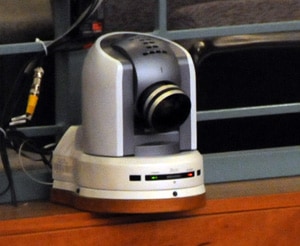
The webcam in the back of the Senate chamber. (Photo by Heath Haussamen)
The New Mexico Legislature has taken huge steps in recent years to let the sun shine on its work through webcasting, but there’s more to be done. And it’s time that the other branches of government follow suit.
It’s great that we can watch and/or listen to the House and Senate when they’re in session, and that we can listen to House committees. But Senate committees still aren’t accessible for people who aren’t at the Roundhouse.
Fortunately, Sen. Mark Boitano, R-Albuquerque, is keeping up the fight this session with a bill that would require audio webcasting of Senate committees. Let’s hope his colleagues finally approve this important legislation.
There’s also an ambitious bill from freshman Rep. James E. Smith, R-Sandia Park, that would essentially require webcasting of every public meeting subject to the N.M. Open Meetings Act. Some local governments, such as Doña Ana County, already do this, but most do not.
The bills are indicative of this reality: All public meetings of policymaking bodies should be webcast.
We should have video webcasting of all House and Senate committees. And, most important, webcasting of the meetings of policymaking bodies needs to be archived online so it’s accessible later.

Heath Haussamen
It’s great that the Legislature has given people the ability to access their meetings even if they can’t travel to the Roundhouse, but it’s still only accessible to people who can drop what they’re doing to sit in front of a computer while the Legislature is in session.
Most legislative work is done while most people are at work and unable to listen in.
So the Legislature has yet to take the most important step – making its proceedings available to people when they have the time to pay attention.
Accessibility needs to be the priority
There’s a bogus argument floating around the Roundhouse that archiving is not a good idea because it would create a permanent record of legislative proceedings. That’s because, opponents of archiving claim, New Mexico courts don’t consider legislative intent in addition to the actual wording of legislation, and creating a permanent record could mess with that.
Like I said, it’s bogus. The first priority should be accessibility. This is a democracy. It’s the 21st Century. We have the technology to make legislative proceedings available to all people at all times, and it’s cheap, so there’s no good reason to not do it.
There are bad reasons – like not wanting more people to participate in their government. If issues related to legislative intent need to be addressed, then address them in another manner, but not by keeping government less accessible than it can be.
One lawmaker told me more webcasting, and archiving, would be nice, but it’s not a priority because few people are watching the webcasting currently. But that’s exactly why it needs to be a priority.
People need to be able to watch legislative proceedings when they can find time – such as after they’ve put their kids to bed at night. Telling people they have to skip work to watch a webcast is simply putting up another barrier.
It’s time to tear down the barriers. We need to webcast all legislative proceedings and archive the webcasts.
Other branches should follow suit
But it’s not just the Legislature that needs to take steps to increase accessibility. The executive and judicial branches do too. I asked Gov. Susana Martinez’s office a few weeks ago if it had plans to webcast news conferences or anything else. I didn’t get a response.
Martinez should be webcasting her news conferences – starting immediately. Her administration should also be working toward webcasting of meetings of all boards and commissions.
And it should all be archived online.
There’s no reason the Supreme Court and Court of Appeals can’t webcast their public proceedings. The number of New Mexicans who have had a chance to watch the Supreme Court at work is even less than the number who have seen the Legislature at work. How about an unprecedented level of accessibility, justices?
The Public Regulation Commission already streams live audio of its meetings. Now it needs to add video and archiving.
Here’s what’s possible
It seems that government in this state was designed from the start to not be accessible. We hold our legislative sessions in the dead of winter in a town in the mountains. Does anyone think this is by accident?
Or was it so that the rich and powerful – which at the time included railroads – could influence lawmakers without pesky citizens being around to know what was going on?
Going forward, citizens need to take greater control of their government. But they’ve been denied real access for so long that the first step is giving them the tools. If we did that, here’s what would be possible:
Joe Blow wants to keep up with a bill that would increase penalties for drunk driving. A drunk driver on the highway between Farmington and Bloomfield killed his niece, and his aging mom wants to know that the penalties are toughened.
He can’t afford to travel to Santa Fe to lobby. Good thing everything is online. He can take an hour during the afternoon to listen to the House floor debate because he worked through the lunch hour, so he’s watching live as the bill passes.
He quickly shoots off an e-mail to his representative, who just voted for the bill. “Thank you thank you thank you! What’s next? Who in the Senate do I need to call or e-mail to push for this?”
Later that afternoon, he takes another few minutes to watch the governor’s news conference on the bill. She’s pushing the Senate. Great.
That night, he pulls up archives of the House debate and the governor’s news conference on his laptop at his mother’s house in Aztec. He sticks headphones in her ears and hits play. She doesn’t have or know how to use a computer, so she wasn’t able to listen live.
“Halfway there,” his mom tells him after listening. “Keep me updated on what happens in the Senate.”
Joe smiles, knowing he’ll be able to do just that.
We have the technology to do this, and it’s cheap. So let’s do it.